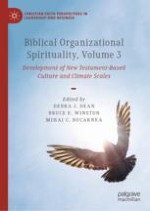This volume introduces scales for measuring organizational spirituality culture and climate. Based on interviews with employees, the chapters present empirical studies confirming the scales' validity and reliability, rooted in principles aligned with Biblical concepts of love. The authors conduct concurrent and discriminant validity studies, comparing these scales with measures of servant leadership, person-supervisor fit, altruistic love, inner life, vision, person-organization fit, affective commitment, continuance commitment, normative commitment, and work-state anxiety in contemporary organizations.
This book offers researchers with two reliable instruments to assess New Testament-based organizational spirituality culture and climate, contributing new insights to the field of organizational spirituality literature and aiding in diagnosing organizational spirituality-related issues.
